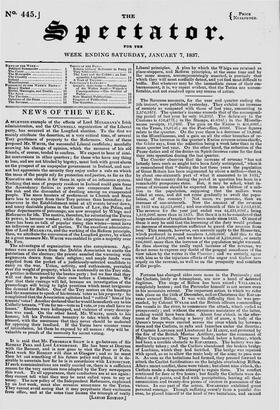The Revenue accounts, for the year and quarter ending the
5th instant, were published yesterday. They exhibit an increase of receipts as compared with those of last year, amounting to 2,570,9571. The quarter's income exceeds that of the correspond- ing period of last year by only 16,231/. The deficiency in the Customs is 450,4771.; in the Stamps, 46,0181.; in the Miscella- neous receipts, 11,703/. The gain on the Excise is 456,000/.; on the Taxes, 19,014/.; on the Post-office, 4000/. These figures relate to the quarter. On the year there is a decrease of 19,000/. in the Miscellaneous, and a gain on all the other branches of re- venue. The increase in the quarter's Excise revenue arises chiefly, the Globe says, from the collection being a week later than in the same quarter last year. On the other hand, the reduction of the Paper-duties and of the duties on Spirit-licences came for the first time into operation during the last quarter. The Courier observes that the increase of revenue " has not latterly been such as might have been fairly anticipated," when it is remembered that "during the last three years the population of Great Britain has been augmented by about a million—that is, by about one-sixteenth part of what it amounted to in 1831," and that the country during the period in question has been in a remarkably prosperous state. But, it may be asked, what in- crease of revenue should be expected from an addition of a mil- lion to the population, supposing that the million were added at once, and did not come gradually to swell the pupa- lation, of the country ? Not more, we presume, than an increase of one-sixteenth. Now the amount of the revenue in 1833 was 42,621,000/.; and one-sixteenth of this is 2,663,813/. The revenue for the year just ended was 44,431,000/.; being 1,810,000/. more than in 1833. But then it is to be considered that large reductions of taxation have been made since 1833. Of most of these it may be said that the lessening of the duty would produce an increase of consumption sufficient to guard the revenue from lose. This remark, however, can scarcely apply to.the House-tax, which produced in round numbers 1,400,0001. Add this to the surplus of 1,810,000/., and we have a total of 3,210,000/., or nearly 600,0001. more than the increase of the population might warrant. In thus showing the really rapid increase of the revenue, we do not mean to express any doubt of the gelaeral soundness of the view taken by the writer in the Courier ; and we entirely, agree with him as to the injurious effects of the sugar and thither mo- nopoly on the revenue, as well as on the prosperity and comforts of the people.






























 Previous page
Previous page